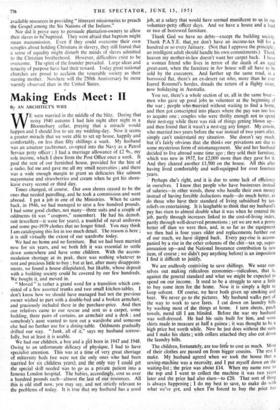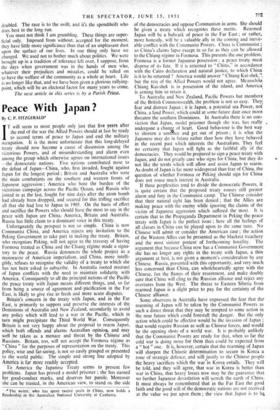Making Ends Meet : II
By AN ARCHITECT'S WIFE WE were married in the middle of the blitz. During that noisy 1940 autumn I had lain night after night in a Bloomsbury cellar, praying that a miracle would happen and I should live to see my wedding-day. Now it seems a greater miracle that we were able to set up house, happily and comfortably, on less than fifty shillings a week. My husband was an amateur yachtsman, co-opted into the Navy as a Patrol Service petty officer ; I had a marriage allowance of £2 9s., my sole income, which I drew from the Post Office once a week. It paid the rent of our furnished house, provided for the hire of a radio, fed me and gave me all my small necessities ; and there was a wide enough margin to grant us delicacies like salmon mayonnaise and strawberries and cream when he got his shore- leave every second or third day.
Times changed, of course. Our own shores ceased to be the ones that needed patrolling, and he took a commission and went abroad. I got a job in one of the Ministries. When he came back, in 1946. we had managed to save a few hundred pounds. I had some good clothes, not many—three suits and a couple of oddments (it was " coupons," remember). He had his demob. suit (excellent—it wore for years), a trunkful of naval uniforms and some pre-1939 clothes that no longer fitted. You may think I am cataloguing this list in too much detail. The reason is here ; it is still virtually the extent of our wardrobe today.
We had no home and no furniture. But we had been married now for six years, and we both felt it was essential to settle down somewhere and have some children. With the accom- modation shortage at its peak, there was nothing whatever to rent and precious little to buy ; but at last, after many disappoint- ments, we found a house dilapidated, but likable, whose deposit with a building society could be covered by our few hundreds. We bought it, and moved in.
" Moved " is rather a grand word for a transition which con- sisted of a few assorted trunks and two small kitchen-tables. I don't know how we should have managed had not the previous owner wished to part with a double-bed and a broken armchair. and graciously included these in the purchase-price. And then our relatives came to our rescue and sent us a carpet, some bedding, three pairs of curtains, an armchair and a desk ; and somebody's aunt wanted to turn out a wardrobe and someone else had no further use for a dining-table. Oddments gradually drifted our way. "Junk, all of it," says my husband sorrow- fully, but at least it is usable. We had our children, a boy and a girl born in 1947 and 1948. Owing to an unfortunate delicacy of physique, I had to have specialist attention. This was at a time of very great shortage of maternity beds (we were not the only ones who had been married for six childless years). and the only way I could get the special skill needed was to go as a private patient into a famous London hospital. The babies, accordingly, cost us over a hundred pounds each—almost the last of our resources. All this is old stuff now, you may say, and not strictly relevant to the problems of today. It is true that my husband has a good job, at a salary that would have seemed munificent to us in our volunteer-petty officer days. And we have a house and a load or two of borrowed furniture.
Thank God we have no debts—except the building society. Thank P.A.Y.E. thatove don't have an income-tax bill for a hundred or so every January. (Not that I approve the principle ; an intelligent adult should handle his own commitments.) Thank heaven my mother-in-law doesn't want her carpet back. I have a woman friend who lives in terror of the death of an aged great-aunt, when the furniture in her house will all have to be sold by the executors. And farther up the same road, in a borrowed flat, there's an ex-desert rat who, more than he ever feared Rommel's hordes, dreads the return of a flighty sister, now holidaying in Australia.
You see, there's a whole section of us, all in the same boat- men who gave up good jobs to volunteer at the beginning of the war ; people who fmarried without waiting to find a home, and then got conscripted into places where the pay was too low to acquire one ; couples who were thrifty enough not to spend their nest-egg while there was risk of things getting blown up— and then found that it wasn't a nest-egg any longer. My cousin, who married two years before the war instead of two years after. simply can't understadd my situation. She doesn't say much, but it's fairly obvious that she thinks our privations are due to some mysterious form of mismanagement. She and her husband deCided to live abroad some time ago ; they sold their furniture, which was new in 1937, for £2,000 more than they gave for it. And they cleared another £1,500 on the house. All this after having lived comfortably and well-equipped for over fourteen years.
Perhaps she's right, and it is due to some lack of efficiency in ourselves. I know that people who have businesses instead of salaries—in other words, those who handle their own money instead of having forcible deductions made—do much better, as do those who have their standard of living subsidised by tax- reliefs on entertaining. It is laughable to think that my husband's pay has risen to almost double what it was when he entered the job, partly through increases linked to the cost-of-living index, partly through well-deserved promotions ; yet we are not a penny better off than we were then, and, in so far as the equipment we then had is four years older and replacements further out of our reach, we.have slipped back.. Every pay-rise is accom- panied by a rise in the other columns of the chit—tax up, super- annuation up—and the National Insurance contribution (a new item, of course ; we didn't pay anything before) is an imposition I find it difficult to justify.
We are endlessly contriving to save shillings. We wear our- selves out making ridiculous economies—ridiculous, that is. against the general standard and what we might be expected to spend on our income. It used to be a struggle to save a little to buy some item for the home. Now it is simply a fight to keep solvent. Of course, we have both given up smoking and beer. We never go to the pictures. My husband walks part of the way to work to save fares. I cut down on laundry bills by washing most of the things at home. I turn sheets, patch towels, mend till I am blinded. Before the war my husband was well-dressed. He had his suits built for him, and wore shirts made to measure at half a guinea ; it was thought to be a high price but worth while. Now he just does without the suits and I make his shirts ; with collars attached they also cut down the laundry bills.
The children, fortunately, are too little to cost us much. Most of their clothes are passed on from bigger cousins. The rest I make. My husband agreed when we took the house that a sewing-machine was a necessity, and I put myself down on the waiting-list ; the price was about £14. When my name rose to the top and I went to collect the machine it was two years later and the price had also risen—to £20. That sort of thing is always happening ; I do my best to save, to make do with what we've got, and when I'm forced to buy the price has
doubled. The race is to the swift, and it's the spendthrift who does best in the long run.
You must not think I am grumbling. These things are super- ficial only. Imposed from without, accepted for the moment. they have little more significance than that of an unpleasant dust upon the surface of our lives. In one thing only have we changed. We used not to bother much about politics. We were brought up in a tradition of tolerance left over, I suppose. from the days when government was in the hands of men who, whatever their prejudices and mistakes, could be relied on to have the welfare of the community as a whole at heart. Life is no longer like that, and we have been given a glorious rallying- point. which will be an electoral factor for many years to come.
The next article in this series is by a Parish Priest.



































 Previous page
Previous page